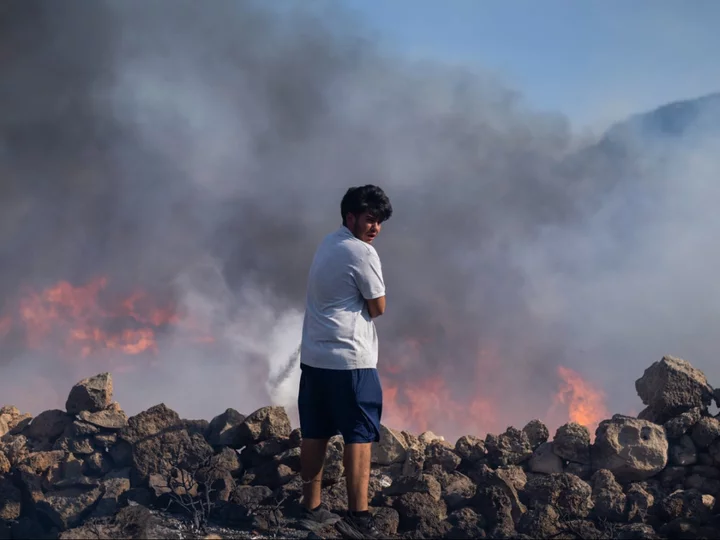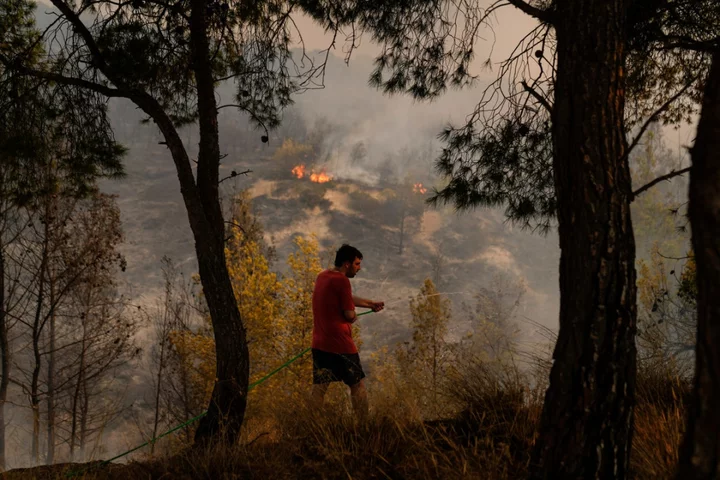
UK rescue flights for tourists fleeing ‘out of control’ wildfires in Rhodes and Corfu
UK airlines are scrambling evacuation flights to the wildfire-ravage islands of Rhodes and Corfu where up to 10,000 British tourists are stranded in a “living nightmare” as a fresh red alert is issued for Crete. The two biggest holiday firms Tui and Jet2 have axed all flights to the island in the coming days after holidaymakers forced to flee their hotels had to sleep on floors in schools, airports and sports centres – but other firms, including Ryanair, Thomas Cook and easyJet continue to fly tourists who want to travel to Rhodes. The popular destination of Crete was also placed under an “extreme” fire warning on Monday, with Greek PM Kyriakos Mitsotakis telling parliament it must “be on constant alert” in the weeks ahead. He declared his country to be “at war” with the blazes and warned of three more “difficult days” before the extreme heat eases. “The climate crisis is already here, it will manifest itself everywhere in the Mediterranean with greater disasters,” Mr Mitsotakis said, just a week after multiple infernos ignited near Athens, destroying homes and businesses, and days after temperatures hit 45C. Prime minister Rishi Sunak urged holidaymakers to remain in touch with tour operators but the Foreign Office has so far not discouraged Britons from travelling to Greece. Urging the UK government to “get a grip”, Lib Dem MP Layla Moran hit out Tory ministers’ “inaction” as she warned current advice was leaving families unable to claim on their insurance to “[pay] the penalty for deciding not to fly out” to Rhodes. More than 2,000 holidaymakers have so far been repatriated in what was described as the largest evacuation in Greek history, with more flights due on Tuesday as Rhodes’ deputy mayor warned the fires remained “out of control” seven days after flaring into life. Helen Tonks, a mother-of-six from Cheshire, accused travel firm Tui of flying her into “living nightmare” on Saturday night, as she told The Sun of landing in Rhodes only to be informed that her hotel had already burned down. The firm has now cancelled all flights to the island until Saturday. Claire Jones, a 36-year-old from Leicestershire on a honeymoon with her new husband Paul was evacuated by coach over the weekend in a “traumatic” journey as fled their hotels on foot carrying babies and small children, with some reporting walking for 10 miles in searing heat. Upgrading the fire risk in Crete to the highest warning level on Monday, Greek authorities also put swathes of the country under notice of a “very high fire risk”, including Athens, the Peloponnese, Karpathos, Kalymnos and Kos. While authorities have suggested the Corfu blazes may be a result of arson, the UK’s former chief scientific advisor Sir David King warned on Monday that the millions of British tourists planning Mediterranean holidays this summer should take Greece as “a big, big warning”. Lamenting that “many people will die from heat stress” due to the relentless heatwaves scorching southern Europe, Sir David said he had “no doubt” that the extreme temperatures are due to melting ice in the Arctic caused by human-led climate breakdown. Temperatures in Rhodes were forecast to climb as high as 40C by Wednesday, as Greece faces its longest heatwave on record. The EU’s civil protection agency has deployed some 450 firefighters and seven planes from Bulgari, Croatia, Cyprus, France, Italy, Malta, Poland, Romania, and Slovakia. But the travel industry appeared to be preparing the ground for a restart in tourism in some of the unaffected areas. A spokesperson for Abta, the travel association, said: “We understand that some of the resorts have had their evacuation order removed by the Greek authorities and people have been advised that they can return to the resorts of Lindos, Pefkos and Kalathos. “Travel companies will be liaising with their accommodation providers to ensure that they are ready to receive customers and customers will be notified accordingly.” Chris Elworthy, a 42-year-old farmer from Faversham in Kent, said he had been left £10,000 out of pocket after his easyJet flights to reach a private villa in Pefkos with his wife and two children were cancelled. “We are now £10,000 out of pocket; easyJet is not helping at all with a flight, despite having promised on Twitter that they would provide a voucher or another flight ... 24 hours later they have done nothing,” he said. “The villa is refusing to refund us, and the holiday insurance is saying that we’re not covered because we didn’t have the additional natural disaster cover on top of the ordinary cover.” Dan Jones, a sports teacher from Torquay, had to climb onto a fishing trawler with his sons to escape the raging fires on Saturday night, describing it as “the scariest moment” in his life and adding: “What brave boys.” Estimating that between 7,000 and 10,000 British tourists were on Rhodes due to it being peak holiday season, Foreign Office minister Andrew Mitchell told LBC that reports of holiday company reps seeming “to have gone missing” was “a deplorable state of affairs” which the government would investigate. But he defended the lack of advice against travelling to Rhodes, saying the fact “that only 10 per cent of the island is affected by these fires” meant tour operators were “best placed to give guidance on whether or not a family or individual’s holidays are going to be ruined by these events”. Downing Street defended not discouraging people from travelling to Rhodes, despite sending a team to help holidaymakers affected by the fires. The PM’s official spokesman said: “The current situation is impacting on a limited area in Rhodes and whilst it’s right to keep it under review and it’s possible that the advice may change we do not want to act out of proportion to the situation on the ground.” There are “not currently” plans to get the RAF to help people leave, he added. Read More Wildfires: Is it safe to travel to Greece right now? Family £10,000 out of pocket after Rhodes holiday ruined by wildfires How long will the wildfires last in Greece? ‘Trauma’ for couple on honeymoon who fled Rhodes fires amid screams and smoke
2023-07-25 02:26

Russians against Ukraine war should spy for the UK, MI6 boss says
The head of MI6 has urged Russians appalled by the war in Ukraine to “join hands” with his spy service and bring the bloodshed to an end. In his second speech since becoming chief of the Secret Intelligence Service in 2020, Richard Moore said there appeared little prospect of Vladimir Putin’s forces regaining momentum in Ukraine – whose long-awaited counteroffensive is now under way. Delivering his speech at the British embassy in Prague, the MI6 chief likened the current situation in Ukraine to the Prague Spring in 1968, when the Soviet Union quashed liberalising reforms. “As they witness the venality, infighting and callous incompetence of their leaders – the human factor as its worst – many Russians are wrestling with the same dilemmas as their predecessors did in 1968,” Moore said. “I invite them to do what others have done this past 18 months and join hands with us. Our door is always open ... Their secrets will be safe with us and together we will work to bring the bloodshed to an end.” While Mr Putin has sought to maintain an iron grip on the war narrative since Russia’s full-scale invasion last February, with the aid of state TV, public opinion of the conflict is likely to have been knocked by Moscow’s apparent military setbacks and his mobilisation of reservists last Septmeber. Many fighting age men have fled abroad to escape the draft, while thousands of protesters have been arrested in infrequent demonstrations across scores of Russian cities since the war began. “There are many Russians today who are silently appalled by the sight of their armed forces pulverising Ukrainian cities, expelling innocent families from their homes and kidnapping thousands of children,” said Mr Moore. “They are watching in horror as their soldiers ravage a kindred country. They know in their hearts that Putin’s case for attacking a fellow Slavic nation is fraudulent, a miasma of lies and fantasy.” More follows... Read More The Body in the Woods | An Independent TV Original Documentary The harrowing discovery at centre of The Independent’s new documentary
2023-07-19 16:59

Brits travelling to Greece given updated travel advice during extreme heat
Britons travelling to Greece have been told to sign up for emergency alerts as the country is gripped by “extreme heat” and wildfires. The UK Foreign Office has updated its travel advice for the popular tourist destination, with Britons warned of travel disruption as temperatures soar. It comes after thousands were evacuated from at least six seaside communities near Athens after their homes were threatened by wildfires. Much of Greece has been baking in near 40C conditions as a heatwave grips the continent, with temperatures in the southeast European country forecast to climb further later this week and into the weekend. “Extreme temperatures are currently affecting many areas of Greece,” the guidance says. “You can register on the Greek government’s Emergency Communication Service to receive emergency alerts.” Travellers are also advised to monitor local and international weather updates from the Greek Meteorological Service or European Meteorological Services, check conditions with their travel provider and follow the advice of local authorities at all times. There is also a chance that the extreme weather conditions could disrupt travel, the Foreign Office added. Officials in Greece issued the six evacuation orders on Monday morning as strong gusts of up to 70kph (45mph) whipped the wildfire closer to resort towns. The army, police special forces and volunteer rescuers freed retirees from their homes, rescued horses from a stable, and helped monks flee a monastery threatened by the flames. Last night water-dropping planes and helicopters tackled the flames near Lagonisi, some 40 km (25 miles) southeast of the capital. The second large wildfire broke out in a wooded area near the resort town of Loutraki, some 90km (55 miles) west of Athens, where a children’s summer camp and rehabilitation center for seniors were evacuated, local officials said. Fire Service spokesman Yiannis Artopios said the strong and changeable winds and mountainous terrain in which both fires broke out were slowing the firefighting effort. "The conditions are changing constantly and this has to be matched by our response. We have ordered multiple evacuations," he said. The evacuees gathered along the coastline or were put up in schools and hotels, while coast guard vessels were dispatched to smoke-heavy beachfronts to assist if needed. On a visit to Brusssels, Greek prime minister Kyriakos Mitsotakis described the risk posed by wildfires this month as "extremely difficult" to deal with. "We have always had wildfires and we always will have them. But with the effects of the climate crisis, we are experiencing fires with increasing intensity," Mr Mitsotakis said, speaking on the margins of talks between leaders from the European Union and Latin American and Carribean countries. Greater Athens and much of southern Greece were on the second highest level of alert for wildfires Monday and Tuesday following a four-day heat wave that eased over the weekend. More heatwave temperatures are expected later in the week. Residents and visitors in areas affected by the two fires received cell phone alerts from the Civil Protection Ministry. Loutraki Mayor Giorgos Gionis said municipal workers were also assisting seniors in the evacuations, adding that the operation had been impeded by cell phone reception outages. Local officials confirmed that homes had been destroyed and badly damaged in both fires. Southern and parts of eastern Europe are currently in the grip of a sweltering heatwave that meteorologists forecast will continue well into this week. Other popular holiday destinations including Italy, Spain and Turkey are also experiencing intense heat. Thousands of people were evacuated from their homes in the La Palma area of the Spanish Canary Islands over the weekend as a wildfire tore through 4,500 hectares of land as firefighters struggled to tackle the blaze. Forecasters in Italy say that Sardinia looks set to become the “epicentre” of the heatwave this week and could see temperatures of 48C (118.4F), just shy of the record 48.8C (119.8F) recorded in Sicily in August 2021. This week’s heatwave has been named Charon after the ferryman who delivered souls into the underworld in Greek mythology. Last week’s was named Cerberus - the name of a mythical creature in ancient Greek folklore. Cerberus, a three-headed dog, was believed to guard the gates to the underworld. Scientists say climate change is making extreme weather events like the current heatwaves in Europe more common. Read More Which holiday destinations will be hottest this week and how can you stay safe as temperatures soar? Europe heatwave: Is it safe to travel to Italy, Spain, Greece and Croatia? Extreme 40C heatwaves will frequently occur in UK without emissions cut, Met Office says Independent Traveller guide to best hotels and short breaks Best hotels in New York: Where to stay in Manhattan, Brooklyn and more Cheap hotels in Paris 2022: Where to stay for value for money
2023-07-18 17:00

Hungary fines book chain for selling British author’s LGBT+ novels
A legal battle appears set to erupt over the sale of a British author’s LGBT+- themed webcomic and graphic novel in Hungary, after Viktor Orban’s government attempted to ban a bookshop from selling it without closed packaging. The country’s second largest bookshop chain Lira has announced that it plans to take legal action after a Budapest government office fined it 12 million forints (£27,500), claiming it broke the law by selling Alice Oseman’s Heartstopper among other books for young adults without wrapping them in plastic foil. The sale of the Kent-born author’s book has fallen foul of a law passed by Mr Orban’s strongly Christian-conservative government banning the “display and promotion of homosexuality” to under-18s, a move viewed as resonating with rural voters ahead of his fourth-term election win in 2022. While the passage of the law in 2021 came despite strong criticism from human rights groups and the EU, the large fine now handed to Lira emerged on the same day that 38 countries, including Germany and the US, urged Budapest to protect the rights of LGBT+ people and scrap its discriminatory laws. Krisztian Nyary, a well-known author who works as creative director at Lira, told Reuters the fine was disproportionate, and criticised the law as vaguely worded as he indicated that the bookshop would respond legally. “As this is a resolution about a fine it cannot be appealed, it can only be attacked – in what way, our lawyers will assess,” he said. “We will use all legal means at our disposal.” Mr Nyary said that some publishers had already voluntarily wrapped their books in plastic coverings in an attempt to comply, but warned that it was not clear whether it was sufficient to place books affected by the law on a shelf for literature aimed for adults. He also said it was uncertain whether LGBT+-themed books meant for adults would also have to be wrapped up or if those could be sold without packaging, adding: “This is all not clear.” The law, which the government claims is aimed at protecting children, has caused anxiety in the LGBT+ community. It currently bans the display of LGBT+ content to minors in schools, literature, films, TV and adverts, while prohibiting the public display of products depicting gender reassignment. More than a dozen EU member states have backed legal action against the law – branded a “disgrace” by European Commission chief Ursula von der Leyen – in the European Court of Justice. In a statement reported by state news agency MTI this week, the Budapest metropolitan government office said an “investigation found that the books in question depicted homosexuality, but they were nevertheless placed in the category of children’s books and youth literature, and were not distributed in closed packaging”. While it is not the first time a Hungarian government office has fined a bookshop for violating the law, the fresh fine came ahead of a Pride march in Budapest on Saturday. Heartstopper has sold millions of copies and has been read more than 50 million times online, prompting streaming giant Netflix to release an adaptation of the ongoing series last April. Ms Oseman, a 28-year-old born in the Kent town of Chatham, who first secured a publishing deal aged 17, was handed two prizes at last year’s Children's and Family Emmy Awards and was nominated for a Bafta over the Netflix adaptation of Heartstopper, which also won Waterstones Book of the Year in 2022. Additional reporting by Reuters Read More Hungary's Orban bemoans liberal 'virus' at CPAC conference ‘Less drag queens, more Chuck Norris!’: Hungary’s Orban wows Republicans The Independent Pride List 2023: The LGBT+ people making change happen Netflix announces Heartstopper season 2 release date
2023-07-15 16:46

What is a Storm Shadow cruise missile?
British defence minister Ben Wallace announced that the top-tier, air launched Storm Shadow cruise missiles lent to Ukraine were striking targets with precision as the country continued to fight off Russia’s full-scale invasion clocking nearly 500 days. “The Storm Shadow missile has had a significant impact on the battlefield,” Mr Wallace said in a statement to the House of Commons on Monday this week, marking the first public acknowledgement of the missile’s use in the continuing war. "Its accuracy and ability to deliver successfully the payload, as sent and designed by the Ukrainians, has been almost without fault,” the defence minister said. “It has had an effect on the Russian army, mainly around its logistics and command and control. That shows the importance of deep fires,” he said. Ukraine’s counter-offensive is evidently in its early stages with the country’s forces repulsing attacks using several western weapon systems to boost its defence operations to stand up against Russia. In its arsenal of striking targets alongside top-tier rocket launcher systems sent from the West, including the HIMARS, are the British Storm Shadow cruise missiles. Manufacturer MBDA has said that the missile, which is fired from an aircraft, carries a range exceeding 155 miles and is designed to evade detection despite flying low after being launched. By contrast, the US-supplied Himars missiles currently used by Ukraine only have a range of around 50 miles. The longer range means Ukrainian pilots will be able to remain further from the front lines. But is still short of the 185-mile range of the US built Army Tactical Missile System, which Ukrainian president Volodymyr Zelensky’s staff had reportedly asked for. Powered by a turbo-jet engine, the 1,300kg Storm Shadow travels at speeds of more than 600mph, is just over five metres long and has a wingspan of three metres. After launch, the weapon, equipped with its own navigation system, descends to a low altitude to avoid detection before locking on to its target using an infra-red seeker. On final approach the missile climbs to a higher altitude to maximise the chances of hitting the target. On impact, it penetrates the target before a delayed fuse detonates the main warhead. Storm Shadow missiles have been used by British and French air forces in the Gulf, Iraq and Libya. In May this year, the UK confirmed it will supply Ukraine with the long-range Storm Shadow missiles it requested for its fight against invading Russian forces. Mr Wallace had touted that the weapons will give Ukraine the “best chance” of defending itself. Read More Ukraine has an array of new Western weapons. What advantages could they offer in a counteroffensive? Russia-Ukraine – live: Putin may take ‘formal control’ of Wagner in wake of attempted coup Tanks, missiles and keeping Russia guessing: The week Ukraine’s counteroffensive truly began What are Storm Shadow cruise missiles and what other weapons has the UK sent to Ukraine?
2023-06-30 18:17
